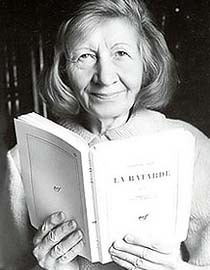It is a mysterious marginalisation: Simone de Beauvoir, who took on Leduc as a protege, remains a feminist icon. Leduc’s contemporary Jean Genet, also wrote sexually explicit, homosexual texts and is widely read and venerated as a pioneer in French avant-garde writing. Not so Leduc. Her first book, the autobiographical novel L’Asphyxie, has still not been translated into English. Her novel Thérèse and Isabelle, written in 1955, was not published uncensored in France until 2000 and was only translated and published in English by the Feminist Press last year.This marginalization doesn't seem all that mysterious to me. Leduc writes not only from a woman's point of view, not only from a lesbian's (or bisexual's) point of view, but also from a scathingly honest working-class point of view. I still remember how, when I read her powerful La Batarde, I felt shocked by its micropolitical revelations of social relations-- not because they were new or scandalous, but because they spoke, without flinching, of feelings and responses that I never saw represented anywhere else. In short, it was written outside and without reference to the canons of middle-class values (including literature's middle-class notions of good taste and fine aesthetics, which did, actually, make the work scandalous). I think I knew even then how difficult, technically, it must have been for her to do that--not through any inhibitions she might have felt, but because forging new stories and new forms of expression for describing what is usually left unexplored is damned hard. (This is something I talked about a little in my WisCon GoH speech.)
Interestingly, Zakaria zooms in, briefly, on her relationship with Simone de Beauvoir, whom she met in 1945 and who was instrumental in getting Leduc's work published:
The juxtaposition of De Beauvoir and Leduc is revelatory in terms of who defines feminism and who actually lives it. Here is Leduc, a woman made feminist by experience: a fatherless, poverty-stricken childhood, a youth spent grovelling for affection and sustenance, her wartime hustle smuggling legs of lamb to rich Parisians. Her autobiography painfully and pointedly underscores her constant alienation, her surfeit of emotion. Ever the outsider, she steals, she smuggles; when she reads and learns, it is in bits and pieces. Days spent writing are imbued with worries about eating, surviving. Uninterested in branding and constructing her own myth, she bluntly tells De Beauvoir that she is not an intellectual. This annoys her mentor, to whom Leduc recalls retorting: “You are an intellectual because you write.”Can we really, after considering Leduc's differences, call Leduc's marginalization "mysterious"? Many of us women writing today need to believe that writing, which requires a constant exertion of will and agency, is liberating. Is this a pipe dream (of the crack, rather than opium, sort)? I don't know, since I'm one of those who feel that my life and who I am has changed through my writing, regardless of its significance or not to others. Would I still feel that way if my current life were even a little less privileged? I must acknowledge the honesty and even despair of Leduc's flat statement that "to write is to change nothing," especially since Leduc's work, however extraordinary, is so little read and has won so little notice, even though for me, reading what other people have written made my childhood bearable and my feminism and political consciousness, in early adulthood, possible. I wonder what she would have made of the new movement (as I'd like to believe it is) of trying to bring marginalized writing to wider attention? Or, more generally, of the resurgent effort to break the hold of the white male perspective on literature?
De Beauvoir spent her time earning the title “intellectual”. Her story is one of early erudition, acing exams, stunning philosophical acuity and a romantic (if also conveniently strategic) alliance with Sartre. In Leduc, she sees the authenticity that she theorises, and in playing midwife to her self-exposition she seeks the vindication of her philosophy. In existentialism, we are all free to choose, exercise our radical free will; the constraints of past experience can be shaken off, truth told and freedom achieved. Leduc’s life, told in her writing, has to be evidence of the truth of this. De Beauvoir’s feminism, unleavened by any literal struggles with the whims of men, needs Leduc’s literary liberation to prove its practical application.
Yet it is only De Beauvoir’s prescient and crisply analysed feminism that we remember and celebrate. The lived feminism of Leduc – raw, passionate, and devastatingly honest – is what we choose to forget. There are contemporary iterations to this divide: like Leduc, the women fighting the battles on the factory floors of China, or in the classrooms of Egypt or the streets of Karachi do not have the luxury of writing their lives and finding liberation. The lived feminisms of the women who clean French hotel rooms, who eke out lives in banlieues, who are expelled from schools for wearing headscarves, are absent from the country’s feminist and literary narrative.
It is still De Beauvoir’s compelling feminist recipe that one wants to believe. It is, however, Leduc’s truth that presses closer: speaking of De Beauvoir’s prescription, she says: “To write is to be liberate oneself. Untrue. To write is to change nothing.”
Happy birthday, Violette Leduc. And now I must go find the newly published Feminist Press edition of Thérèse and Isabelle

No comments:
Post a Comment